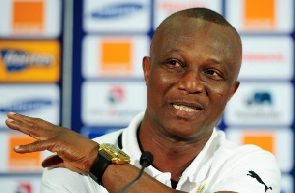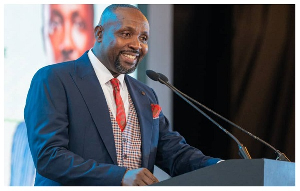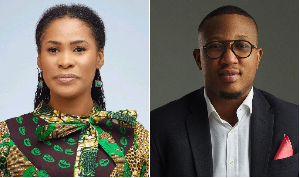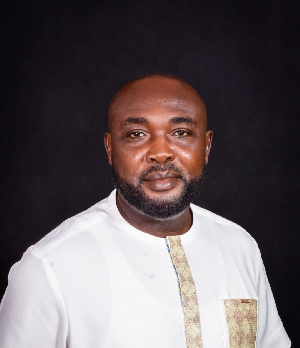WHILE GHANAIANS wait patiently for a possible presidential debate ahead of this year?s general election, the students of the University of Ghana, Legon, last Monday summoned the major political parties to campus to engage each other in a hot political debate on issues in their respective manifestos. The purpose of the debate was for the parties to make expositions on how they intend to practicalize the documented policies in their manifestoes to reflect the needs and aspirations of the citizenry.
Prior to the commencement of the debate, the moderator, Mr. Samuel Okudzeto Ablakwa, reminded the speakers to focus on issues in their speeches rather than resorting to personal attacks and gaffes that may tend to mar the debate.
Mr. Michael Dede, who represented the CPP, was the first to tell the students what his party had in stock for the people of this country. Dede who is the party?s parliamentary candidate for the Ho Central constituency in the Volta Region, started by noting that the CPP was the only political party that had a motto that was reflective of the aspirations of this nation ? Forward ever, Backward never.
He did not hesitate to announce the party?s commitment to rejuvenating the ideals of the first president of the country, Dr. Kwame Nkrumah. The young politician emphasized that by being committed to Nkrumaism, the CPP was poised to continuing with the good works that were started by the Nkrumah regime.
Dede stressed that through the pursuit of Nkrumaism Ghanaians would have their self dignity restored, with their conditions of living greatly improved ?since the ideals of the late Dr. Nkrumah are synonymous with self identification, self respect, national growth and development.?
?People sometimes argue that Dr. Nkrumah was able to do a lot for this country because he came to meet no national debt but rather some reserves which he used for the numerous development projects. Granted that this is true, what have the subsequent governments done for the country after they had resorted to borrowing billions of dollars to develop the country? The Ghana today still remains just as Nkrumah left it and why should this be the case?? Dede wondered.
The CPP stalwart intimated that all governments that had ruled the nation with the exception of Nkrumah?s CPP, had been a disincentive to the development of the county because of ? the high level of mismanagement and corruption.?
He pledged that the CPP would not disappoint the citizenry if given the mandate to rule the nation after December 7.
Also featuring on the dais for the CPP was the party?s Deputy National Treasurer, Mr. Ekow Dunkan.
The next speaker was Mr. Joe Donkor, Deputy Minister of Education, Youth and Sports and NPP Member of Parliament (MP) for Tano North, who led a couple of NPP functionaries to the debate.
Hon. Donkor observed that from all indications, it was clear that the electorates had resolved to give the ruling party another four-year mandate to continue with the good works that it had done for the less than the four years that it had been in power.
According to the NPP representative, his party had already demonstrated that it was a party that represented the interest of the ordinary Ghanaian, adding that the party?s manifesto dubbed ? Positive Change, So Far, So Very Good? contained policies and programmes that clearly reflected the developmental aspirations of the country.
?This government has given an account of what it promised to do for the people of this country during the 2000 electioneering campaign. Over the last couple of years, the government has been able to put up a number of schools in the countryside, roads are being constructed here and there and through the judicious utilization of the HIPC benefits other infrastructure developments are going on all over the country,? the deputy minister argued.
Pushing forward the NPP agenda, the MP indicated that the NPP government inherited an economy that was almost in shambles but had been able to, within the last three years, put it on a sound footing through the pursuit of prudent economic policies.
The deputy minister cautioned that Ghanaians would be doing a great disservice to themselves and the nation as a whole if they failed to give the NPP another four-year mandate in the upcoming general election.
Other representatives of the NPP at the forum were the party?s parliamentary candidates for the Ayawaso West Wuogon constituency and others who introduced themselves as activists of the party.
Then came the turn of the largest opposition party, the NDC to make its submissions. The party?s ?defence counsel? for the occasion was the Deputy General Secretary, Mr. Baba Jamal who is also the party?s parliamentary candidate for Akwatia.
Mr. Jamal started by saying that the current NDC was different from the NDC that ruled the country from January 7, 1993 to January 6, 2001. ? I am a member of the NDC but not a member of the NDC that ruled this country. I was part of those who fought against the NDC government through the Mmobrowa students struggle and this should tell you that this NDC is a new NDC with a new agenda,? he stressed.
He told the gathering that it was very important for Ghanaians to know the state of the nation at the time the NDC left office as the governing party and the current state of the nation.
This, he said, would help Ghanaians understand the political terrain to enable the electorate make informed choices.
Mr. Jamal noted that at the time the NDC left office in January 2001, the nation had a total debt of ? 41 trillion made up of $8 billion external debt, ?1.6 trillion at the Tema Oil Refinery (TOR) and a ? 9trillion domestic debt accumulated from 1957 to 2000.
The Deputy General Secretary noted that for the less than four years of the NPP?s administration, the total national debt had, as at June, been increased to ?79 trillion made up of $7.4 billion external debt, ?13.4 trillion domestic debt and ?4.5 trillion debt at TOR.
Continuing his submission, the aspiring NDC lawmaker observed that during the days of the NDC, the minimum wage was ?4,200 while a gallon of petrol sold at ?6,800 and people complained.
Today, he continued, while the minimum wage had been increased to ?11,200, a gallon of petrol sells at ?20,000 per gallon.
Jamal intimated that the difference was clear, noting that Ghanaians were now going through much more difficult times than during the NDC era. He consequently urged the electorate to replace the NPP and its ?bad economic policies? with the new NDC, which he said had a better vision for the people of this country.
Mr. Bernard Morna, representing the PNC and not the grand coalition, first intimated that the decision of chairman of the coalition, Mr. Dan Lartey to withdraw from the coalition would really affect the vision and the fortunes of the group.
He however, did not hesitate to launch a blistering criticism on the ruling government. He was of the view that the NPP government was mismanaging the economy and had accordingly, subjected Ghanaians to very hard conditions of living.
?Today the largest poultry farmer in the country, Mr. Kwabena Darko, instead of being the leading exporter of poultry products has unfortunately become the leading importer of poultry products. How can we run an economy like this,? he quizzed.
At the end of the forum, the common words among students were, ?this year?s elections are going to be very keen and will not be easy for any of the parties.?
Meanwhile, some of the students told this reporter that they expected their leaders and the authorities at the Political Science Department to make the necessary arrangements to hold one of the pre-election presidential debates on the campus of the University to enable the student vote on their choice more especially on issues.
The Chronicle?s searchlight revealed that arrangements are underway for all the aspiring MPs in the constituency to engage each other through a similar forum.
Click to view details



Politics of Wednesday, 6 October 2004
Source: Chronicle
















